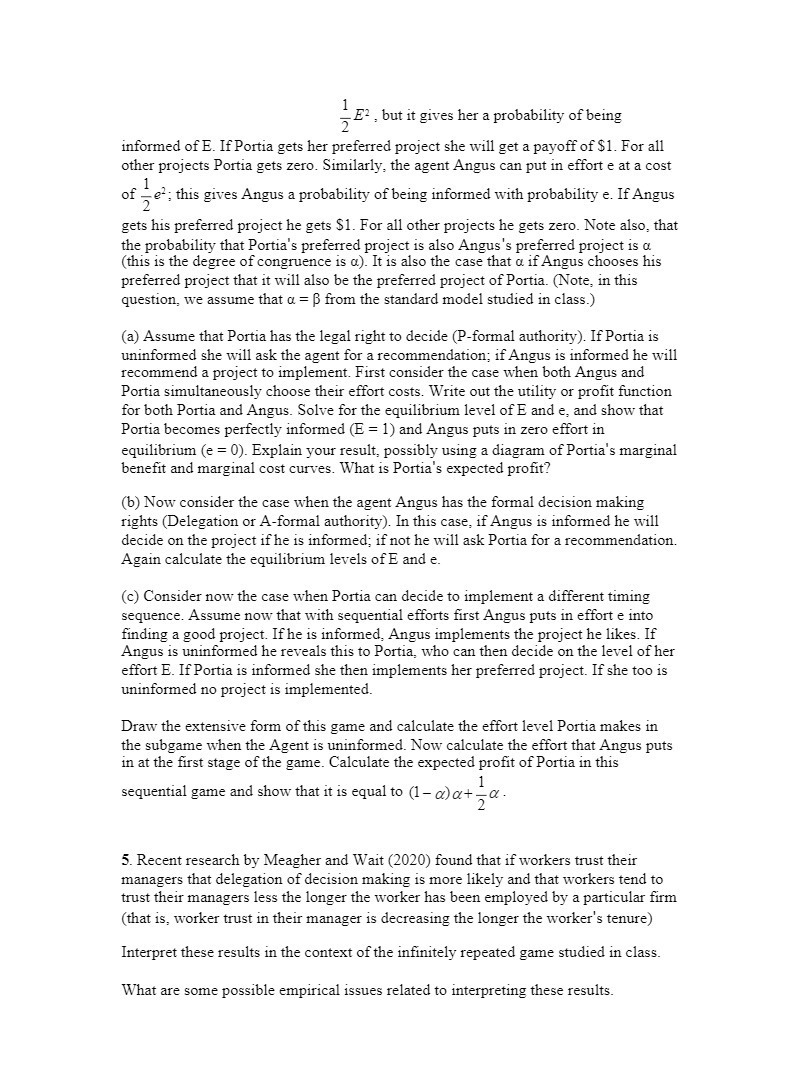
}? , but it gives her a probability of being informed of E. If Portia gets her preferred project she will get a payoff of $1. For all other projects Portia gets zero. Similarly, the agent Angus can put in effort e at a cost 1 of E e1 ; this gives Angus a probability of being informed with probability e. If Angus gets his preferred project he gets $1. For all other projects he gets zero. Note also, that the probability that Portia's preferred project is also Angus Is preferred project is a. {this is the degree of congruence is a). It is also the case that [r if Angus chooses his preferred project that it will. also be the preferred project of Portia. (Note, in this question= we assume that o = from the standard model studied in class.) {a} Assume that Portia has the legal right to decide (P-formal authority}. If Portia is uninformed she will ask the agent for a recommendation; if Angus is informed he will recommend a project to implement. First consider the case when both Angus and Portia simultaneously choose their eEmt costs. W'rite out the utility or prot function for both Portia and Angus. Solve for the equilibrium level of E and e, and show that Portia becomes perfectly informed {E = I) and Angus puts in zero effort in equilibrium (e = ). Explain your result, possibly using a diagram of Portia's marginal benefit and marginal cost curves. What is Portia's expected profit? {b} Now consider the case when the agent Angus has the formal decision making rights (Delegation or Aformal authority}. In this case, if Angus is informed he will decide on the project if he is informed; if not he will ask Portia for a recommendation. Again calculate the equilibrium levels of E and e. {c} Consider now the case when Portia can decide to implement a different timing sequence. Assume now that with sequential eEons rst Angus puts in effort e into finding a good project. If he is informed, Angus implements the project he likes. If Angus is uninformed he reveals this to Portia: who can then decide on the level of her eEmt E. If Portia is informed she then implements her preferred project. If she too is uninformed no project is implemented. Draw the extensive form of this game and calculate the effort level Portia makes in the subgame when the Agent is uninformed. Now calculate the effort that Angus puts in at the rst stage of the game. Calculate the expected prot of Portia in this sequential game and show that it is equal to (1 g)g+ gm . 5. Recent research by Meagher and 'Wait (2020} found that if workers trust their managers that delegation of decision making is more likely and that workers tend to trust their managers less the longer the worker has been employed by a particular firm {that is, weaker trust in their manager is decreasing the longer the worker's tenure} Interpret these results in the context of the infinitely repeated game studied in class. What are some possible empirical issues related to interpreting these results








